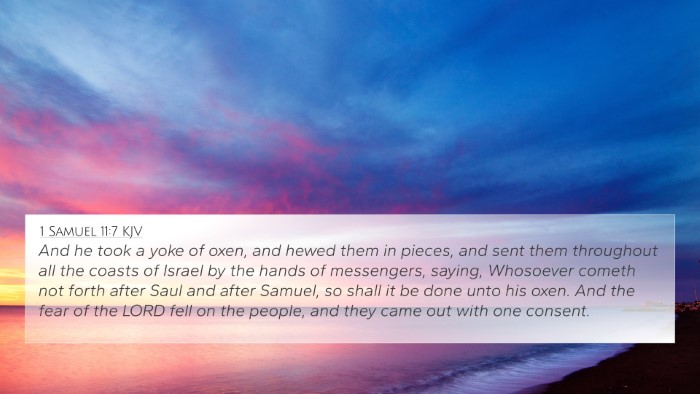Understanding Judges 19:29
Judges 19:29 is a significant verse that concludes a dark and complex narrative within the Book of Judges. The verse reads:
"And when he was come into his house, he took a knife, and laid hold on his concubine, and divided her, together with her bones, into twelve pieces, and sent her into all the coasts of Israel." (Judges 19:29 KJV)
This action signifies an extreme and shocking response to a grievous crime, highlighting the themes of injustice, moral decay, and the societal chaos present in Israel during this period.
Summary of Insights
Public domain commentaries offer rich insights into this verse:
-
Matthew Henry:
Henry emphasizes the brutal reality of the times in Israel, where moral standards had fallen. The division of the concubine's body was a dramatic act meant to provoke a response among the tribes of Israel, showcasing the depths of despair and the need for justice.
-
Albert Barnes:
Barnes notes that the act symbolizes a call to action, as the pieces served as a grim message against the atrocities that had been committed. The division signifies not only the physical but also the spiritual disintegration of Israel, serving to unite the tribes against a common gross injustice.
-
Adam Clarke:
Clarke offers insights into the cultural practices of the time, explaining that such an act, while shocking, was not entirely unprecedented in contexts of extreme mourning and protest. He interprets this event as a desperate attempt to rally support and force the hands of the Israelites in confronting evil.
Thematic Connections and Biblical Cross-References
This verse can be explored through various thematic connections and cross-references with other scripture passages:
-
Genesis 34:25: The violent retaliation by Simeon and Levi against Shechem can be compared, reflecting on how violence begets violence within Israel.
-
1 Samuel 11:7: Saul’s rallying of Israel after a grievous attack echoes the call to unity against injustice represented by the dismembered body of the concubine.
-
2 Samuel 4:12: The avenging of a crime through public demonstration reflects similar elements found in Judges 19:29, showcasing the culture of vengeance.
-
Matthew 5:30: The New Testament metaphor of cutting off a body part that causes sin resonates with the brutal symbolism found in Judges 19:29.
-
Hebrews 12:24: The call for justice and the avenging of blood calls back to the earlier narratives within the Old Testament.
-
Luke 17:2: Instances where severe judgment is mentioned can be associated with the need for accountability for grievous wrongs.
-
Jeremiah 9:1: The prophet's lament over Israel's condition parallels the sorrowful reaction of the Levite in Judges, highlighting the moral decline.
-
Romans 12:19: The New Testament’s perspective on vengeance connects to the themes of justice showcased by the Levite’s actions.
-
Proverbs 28:17: This verse underscores the consequences of violence, connecting with the broader themes present in the narrative of Judges.
-
Galatians 6:7: The principle that one reaps what they sow can be considered in light of the resulting chaos in Israel due to sin and lawlessness.
The Role of Cross-Referencing in Bible Study
The act of cross-referencing Bible verses enriches the study of scripture, enabling readers to identify thematic connections that enhance understanding. Utilizing tools such as a Bible concordance or a Bible cross-reference guide can aid in uncovering relationships between verses.
How to Utilize Cross-References
Cross-referencing can lead to a deeper appreciation of biblical themes by:
-
Identifying Patterns: Discovering similar themes or messages across different texts enhances one's comprehension of scripture.
-
Enhancing Sermon Preparation: Biblical cross-references can provide a richer foundation for sermons, allowing for broader thematic exploration.
-
Studying Biblical Narratives: Understanding how different narratives connect helps in comprehending the overarching story of scripture.
Conclusion
Judges 19:29 serves as a powerful reminder of the tragic consequences of sin and moral decay within society. By engaging in comparative Bible verse analysis and employing cross-referencing tools, believers can unlock deeper insights into this and related verses, uncovering the profound messages of justice, vengeance, and the human condition in the biblical narrative.






